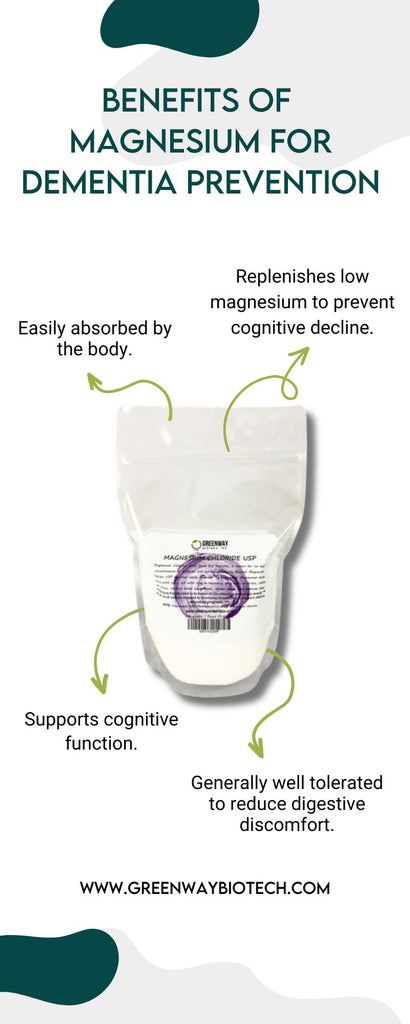Is Magnesium Helpful Against Dementia?
•Posted on April 24 2024

In an age where cognitive health concerns loom large, the quest for effective prevention and treatment methods against dementia intensifies.
Amidst this pursuit, the role of magnesium has emerged as a topic of interest and intrigue. Can magnesium truly reduce dementia risk?
Let's delve into this question, exploring the relationship between magnesium supplementation and cognitive health.
Recommended for You:

Understanding Dementia

Dementia is a broad term encompassing various cognitive impairments that interfere with daily functioning.
It's not a specific disease but rather a syndrome characterized by a decline in memory, thinking, behavior, and the ability to perform everyday activities.
Alzheimer's disease is the most common cause of dementia, accounting for 60-80% of cases.
However, other types of dementia include vascular dementia, Lewy body dementia, and frontotemporal dementia.
Signs of Early Onset Dementia

Recognizing the signs of early onset dementia is crucial for timely intervention. While symptoms can vary depending on the type of dementia, common indicators include:
- Memory loss affecting daily activities
- Difficulty in planning or solving problems
- Confusion about time or place
- Challenges in completing familiar tasks
- Changes in mood or personality
- Withdrawal from social activities
Early detection allows for better management and potentially slows the progression of the condition.
Related Post: How to Improve Gut Health With Magnesium
Is Dementia Type 3 Diabetes?

Recent research has suggested a link between insulin resistance in the brain and Alzheimer's disease, leading some experts to refer to Alzheimer's as "type 3 diabetes."
Insulin resistance impairs glucose uptake in brain cells, contributing to neuronal dysfunction and cognitive decline. While the exact mechanisms remain under investigation, addressing insulin resistance is considered a promising approach in dementia prevention and treatment.
Risk Factors for Dementia

Several factors increase the risk of developing dementia, including age, genetics, lifestyle, and medical conditions.
Advancing age is the most significant risk factor, with the likelihood of dementia doubling every five years after the age of 65.
Genetic factors, such as carrying the APOE ε4 allele, also play a role in predisposing individuals to dementia. Lifestyle factors like physical inactivity, poor diet, smoking, and excessive alcohol consumption can further elevate the risk.
Medical conditions such as cardiovascular disease, diabetes, and depression are also associated with an increased risk of dementia.
Recommended for You:

Understanding the Difference between Dementia and Alzheimer's Disease

Distinguishing between dementia and Alzheimer's disease is essential for accurate diagnosis and appropriate treatment.
While dementia refers to a set of symptoms affecting cognitive function, Alzheimer's disease is a specific neurodegenerative disorder characterized by the accumulation of amyloid plaques and tau tangles in the brain.
Alzheimer's is the most common cause of dementia, but not all dementia cases are due to Alzheimer's disease.
Types of Dementia Disease

Dementia encompasses a spectrum of conditions, each with its own distinct features and underlying causes:
- Alzheimer's Disease: Characterized by progressive memory loss and cognitive decline, Alzheimer's is the most common form of dementia.
- Vascular Dementia: Caused by reduced blood flow to the brain, often due to stroke or small vessel disease, leading to cognitive impairment.
- Lewy Body Dementia: Hallmarked by the presence of abnormal protein deposits called Lewy bodies in the brain, causing fluctuations in cognitive function, visual hallucinations, and motor symptoms.
- Frontotemporal Dementia: A group of disorders affecting the frontal and temporal lobes of the brain, leading to changes in behavior, personality, and language.
Related Post: Treating Epilepsy and Other Neurological Conditions With Magnesium
Can Magnesium Reduce Dementia Risk?

Now, let's turn our attention to the potential role of magnesium in reducing dementia risk.
Magnesium is an essential mineral involved in numerous physiological processes, including neuronal function, neurotransmitter regulation, and synaptic plasticity.
Research suggests that magnesium deficiency may contribute to cognitive decline and neurodegenerative disorders, making it a potential target for intervention.
Greenway Biotech offers high-quality magnesium supplements formulated to support overall health and well-being.
By replenishing magnesium levels, these supplements may help mitigate the risk of dementia and improve cognitive function.
The best magnesium to take for dementia prevention is one that is highly bioavailable and easily absorbed by the body.

How Can Greenway Biotech Magnesium Supplements Reduce the Risk of Dementia?

Our magnesium supplements provide a convenient and effective way to ensure adequate magnesium intake.
By maintaining optimal magnesium levels, these supplements support brain health and function, potentially reducing the risk of dementia and cognitive decline.
Magnesium plays a vital role in neurotransmitter release, synaptic plasticity, and neuronal signaling, all of which are essential for cognitive function.
Recommended for You:

What is the Best Magnesium to Take to Prevent Dementia?

When selecting a magnesium supplement for dementia prevention, it's essential to choose one that is highly bioavailable and well-tolerated.
We offer offers a range of magnesium formulations, including magnesium chloride, magnesium sulfate and magnesium oil - each with its own unique benefits.
Magnesium chloride is easily absorbed by the body and helps maintain generally healthy magnesium levels.
Meanwhile, magnesium sulfate and magnesium oil present alternative options if you're looking for a topical magnesium product.
How to Take Greenway Biotech Magnesium?

To reap the benefits of Greenway Biotech magnesium supplements, it's essential to follow the recommended dosage instructions provided on the product label.
Magnesium supplements are typically taken orally with water, preferably with a meal to enhance absorption and minimize gastrointestinal side effects.
It's important to consult with a healthcare professional before starting any new supplement regimen, especially if you have underlying health conditions or are taking medications.
Related Post: Is Topical Magnesium Helpful to Treat Health Conditions?
In conclusion, while the relationship between magnesium supplementation and dementia risk reduction warrants further research, evidence suggests that maintaining optimal magnesium levels may support cognitive health and function.
We offer a range of high-quality magnesium supplements designed to promote overall well-being and potentially reduce the risk of dementia.
By addressing nutritional deficiencies and supporting brain health, magnesium supplementation may offer a promising avenue for dementia prevention and treatment.
In the ongoing quest for the best treatment for dementia, exploring innovative approaches like magnesium supplementation holds promise for improving outcomes and enhancing quality of life for individuals affected by this debilitating condition.
Comments
0 Comments
Leave a Comment